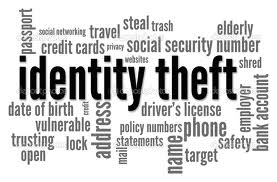Posts Tagged ‘prevent identity theft’
Protect Against ID Theft With These Holiday Shopping Tips
It’s easy to let your guard down during the hustle and bustle of holiday shopping. But according to the Consumer Federation of America identity theft rates reach their peak around the holiday season. From pick pockets to online scams to credit card skimming, identity thieves are on the prowl to take advantage of consumers who are too busy to look out for them. Luckily, there are many things you can do to protect against ID theft this holiday season and keep your identity safe for the New Year.
Be Aware of Pick Pockets
 Pick pockets are out in full force during the holiday shopping season. Ladies, carry a small purse close to your body (or avoid bringing one altogether), and gentlemen, put your wallet in your front pocket. Keep an eye on your personal belongings at all times. A stealthy thief only needs a second to brush up against you and disappear into the crowd with your credit cards and ID. For even better protection, buy an RFID-blocking wallet to prevent thieves from scanning the RFID chip in your credit cards.
Pick pockets are out in full force during the holiday shopping season. Ladies, carry a small purse close to your body (or avoid bringing one altogether), and gentlemen, put your wallet in your front pocket. Keep an eye on your personal belongings at all times. A stealthy thief only needs a second to brush up against you and disappear into the crowd with your credit cards and ID. For even better protection, buy an RFID-blocking wallet to prevent thieves from scanning the RFID chip in your credit cards.
Protect Yourself Online
Online holiday shopping is convenient, but it also puts you at risk for identity theft. Any online shopping should only be done over an encrypted connection. You can protect against ID theft by making sure the site has a verified security certificate as well. When you get to the payment section of your order, check the website’s address to make sure it begins with “https” (the “s” indicates a secure site) and includes a padlock icon. Clicking the icon will allow you to view the security certificate.
You also want to avoid making bank transfers over your cell phone or when using a public wireless network. Identity thieves may be monitoring those connections to gain access to your bank account information. If you must do banking via cell phone consider establishing a virtual private network (VPN).
Don’t Toss Papers and Receipts Away
Tossing out receipts and any other paperwork containing your personal information is never safe. This is especially true during the holidays when you have lots of shopping bags and trash going in and out of the house. Identity thieves have no qualms with sifting through your garbage to find the information they need. Protect against ID theft by shredding all documents that have your full name, date of birth, credit card information, Social Security number, and any other personal information instead of throwing them in the wastebasket.
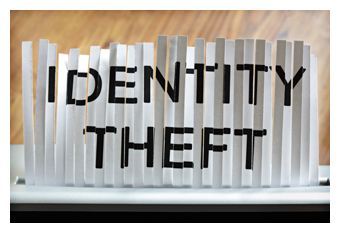 Safeguard Your Credit Card Information
Safeguard Your Credit Card Information
Shop with cash to reduce the chances of identity theft whenever you can this holiday season. If you need to shop with a credit/debit card, only use ATMs you trust. Many identity thieves install card skimmers on ATMs in high-traffic areas to swipe your debit card information. Skimmers are virtually undetectable to the naked eye, so you won’t know you’re a victim of identity theft until you see the fraudulent charges on your statement—and by then it may be too late to recover the charges. Remember that debit cards need daily monitoring.
When shopping online, try filtering the purchase through a payment gateway like PayPal or use a debit card specific for online shopping, instead of entering your credit card information directly on the site. Protect against ID theft by only buying from reputable websites (remember that HTTPS security) and, if you’re having your merchandise shipped, make sure to request a signature so you know when and who received it.
Be Proactive
Finally, check your credit card statements at least once a month and view your credit report by signing up for creditkarma.com to make sure nothing is amiss. You can also be proactive by using an identity theft protection service such as ID Theft Solutions. This trusted and affordable identity theft prevention firm is the only one that guarantees to recover your identity when it’s stolen.
Don’t become another identity theft victim this holiday shopping season. Take a few extra precautions, shop safely, and enjoy! Remember to visit www.TheIdentityAdvocate.com or call 310.831.4400 for more tips to protect against ID theft all year long.
4 Tips to Prevent Elderly Identity Theft
More than 12 million people had their identities stolen last year—a shocking statistic that continues to rise. While anyone can become a victim of identity theft, this crime especially impacts seniors who often have more wealth and have spent a lifetime developing good credit.
Elderly identity theft is common among seniors for many reasons. They are generally more trusting than younger adults, not as aware of identity theft risks and scams, and are also more likely to know the identity thief. They are prime identity theft targets online, over the phone, and even in their own homes since they’re less likely to suspect loved ones of the crime.
 Whether you’re a senior or a family member looking for ways to prevent elderly identity theft, there are many things you can do to stay protected. Let’s take a closer look at four tips to prevent identity thieves from claiming another senior victim.
Whether you’re a senior or a family member looking for ways to prevent elderly identity theft, there are many things you can do to stay protected. Let’s take a closer look at four tips to prevent identity thieves from claiming another senior victim.
1. Be Safe Online
Seniors who are typically less familiar with Internet security should avoid risky behavior online. This includes online banking and providing personal information in response to email spam. Encourage them to conduct all of their banking in person and ignore emails from people they don’t know. It is also a good idea to install security software on their computer to help prevent hackers from accessing their private information.
2. Freeze Credit
You should also implement a credit freeze. Freezing credit is easy to do and it’s an effective way to avoid elderly identity theft. To freeze a loved one’s credit you will need to contact the three credit agencies (TransUnion, Equifax, and Experian) and request a freeze. You will be required to provide the full name, address, Social Security number, a copy of a government-issued ID, and a copy of a bank statement, insurance statement, or utility bill. The freeze won’t allow any new credit accounts—including loans, bank accounts, and rental agreements—to open unless you give the credit bureau the permission and the password to unfreeze the account.
3. Stop Junk Mail
It’s easy to ignore junk mail, but many of us forget how much personal information it can contain. You can help your elderly loved one opt-out of receiving junk mail by following the instructions on www.OptOutPreScreen.com or by calling 1-888-567-8688. This eliminates or at least significantly reduces junk mail such as pre-approved credit card offers that provide opportunities for identity thieves. To prevent elderly identity theft you also want to make sure you shred all promotional mail that includes personally identifying information. Remember that simply tossing this type of mail in the trash makes it easier for dumpster divers to steal your loved one’s identity.
4. Keep Private Information Private
 Credit cards, Medicare cards, and Social Security numbers are among the most sought after sources of information identity thieves use to commit elderly identity theft. Seniors should keep information such as Medicare statements in a safe or safe deposit box, and shred them after confirmed treatments. They should never carry their Social Security card with them and carry their Medicare card only to doctor visits.
Credit cards, Medicare cards, and Social Security numbers are among the most sought after sources of information identity thieves use to commit elderly identity theft. Seniors should keep information such as Medicare statements in a safe or safe deposit box, and shred them after confirmed treatments. They should never carry their Social Security card with them and carry their Medicare card only to doctor visits.
Identity thieves regularly take advantage of the fear many seniors have about their Social Security benefits and Medicare coverage. A trusting senior may assume that the person at the door, on the other end of the phone line, or in an email are simply doing their job when they ask for their Medicare information. However, a common elderly identity theft scam is for a thief to call a senior and claim to be from the Medicare office. The thief asks for verification of the senior’s Medicare account number so that benefits can be paid, and then disappears with all of the information he needs to create a new identity. Make sure your loved one is aware that the Medicare office will never ask for this type of verification via phone, email, or in person.
Start Preventing Elderly Identity Theft
In addition to following these tips, you should also stay in regular contact with your elderly loved one to keep track of any suspicious behavior. There are also several ways to proactively stop identity theft. Sign-up with a prevention and recovery service such as ID Theft Solutions so the solutions for protecting your identity are all in one place. When your identity is compromised, you will have a personalized, one-to-one partner to take on the time-consuming recovery process on your behalf.
As always, you can rely on The Identity Advocate to keep bringing you tips to safeguard the identity of all of your family members. Learn more about preventing elderly identity theft, medical identity theft, social media identity theft, and all other forms of identity fraud by visiting www.TheIdentityAdvocate.com or by calling 310.831.4400.
How to Prevent Medical Identity Theft As Healthcare Reform Rolls-Out
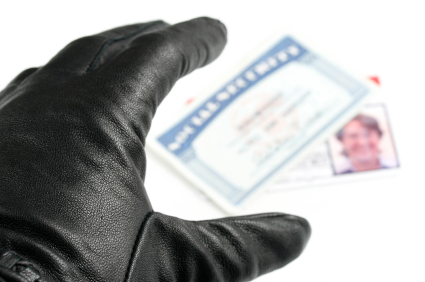 The launch of healthcare reform begins in October 2013 and has many people worried. Unfortunately, this concern isn’t just about the Affordable Care Act itself. Identity theft experts warn that the already high instances of medical identity theft are set to explode, especially as millions of Americans start looking for insurance options.
The launch of healthcare reform begins in October 2013 and has many people worried. Unfortunately, this concern isn’t just about the Affordable Care Act itself. Identity theft experts warn that the already high instances of medical identity theft are set to explode, especially as millions of Americans start looking for insurance options.
They have reasons to worry. Medical identity theft affected 1.85 million Americans this year at a cost of $41.3 billion, according to the Ponemon Institute. As the opportunities for medical identity thieves increase, many more Americans can expect to become targets. The Federal Trade Commission received over 83,000 fraud complaints in 2012 regarding “imposter scams,” in which identity thieves pose as representatives of government agencies to collect personal information. Officials expect these numbers to grow exponentially once the Affordable Care Act begins to roll-out.
The Threat of Healthcare Fraud and Medical Identity Theft
There is a lot of confusion regarding the Affordable Care Act. Signed into law in 2010, enrollment through the healthcare “exchange” begins on October 1, 2013 for coverage starting January 1, 2014. Consumer confusion about the implementation of the law has allowed identity thieves to get a jumpstart on stealing medical identities using information such as Social Security numbers, addresses, Medicare account information, medical history, and other private information.
Gaining access to this information enables identity thieves to fraudulently receive medical care, purchase prescription medications, order medical supplies, and submit false insurance claims—among other forms of healthcare fraud. Although anyone can be a target of medical identity theft, people with the highest risk of fraud include senior citizens, individuals who don’t speak English, and those who have never had insurance coverage or have experienced a lapse in coverage.
 One of the latest healthcare reform scams and medical identity theft occurs when a scammer contacts someone and tells him he’s been selected for early enrollment. The scammer poses as a federal employee and tells him that he must supply his personal and financial information, including bank account data, to receive his insurance card. What most consumers are unaware of is that there are no insurance plans or cards directly associated with the Affordable Care Act. Insurance companies, not the federal government, provide these cards, so beware of anyone who asks for this information.
One of the latest healthcare reform scams and medical identity theft occurs when a scammer contacts someone and tells him he’s been selected for early enrollment. The scammer poses as a federal employee and tells him that he must supply his personal and financial information, including bank account data, to receive his insurance card. What most consumers are unaware of is that there are no insurance plans or cards directly associated with the Affordable Care Act. Insurance companies, not the federal government, provide these cards, so beware of anyone who asks for this information.
Preventing Medical Identity Theft
Although some medical identity theft is inevitable with the Affordable Care Act, there are ways you can protect yourself and limit the chances of becoming an identity theft victim:
- Be proactive to prevent medical identity theft by signing up for an identity theft protection service such as ID Theft Solutions.
- Never provide or verify personal information over the phone, even if the caller claims to be a federal employee. Federal agencies already have this information on file, so you will never be called to supply it.
- Don’t automatically believe a caller ID screen indicating that a state or federal government agency is calling. Scammers have the latest technology and can display a government agency’s name on your caller ID.
- The government does not send unsolicited emails to request personal information. It only sends correspondence through U.S. mail. You can check the authenticity of a letter by looking up the agency’s phone number yourself and calling it for verification.
- Government employees do not make house calls, nor will they show up at your door requesting information or selling Affordable Care Act-related healthcare plans. Again, legitimate federal employees would already have your information on file.
The best way to prevent medical identity theft as healthcare reform goes into effect is to be aware of the warning signs, stay vigilant, ask plenty of questions, and never hand over your personal information. You can also take advantage of the tools, resources, and advice to avoid medical identity theft by visiting the experts at The Identity Advocate at www.TheIdentityAdvocate.com or by calling 310.831.4400.
The Right Prescription to Prevent Medical Identity Theft
 What do you do with your empty prescription bottles? What about all of the medical information you receive, such as your explanation of benefits? Being careless with your personal medical information can be dangerous, and the theft of this priceless data can be deadly.
What do you do with your empty prescription bottles? What about all of the medical information you receive, such as your explanation of benefits? Being careless with your personal medical information can be dangerous, and the theft of this priceless data can be deadly.
Approximately 1.5 million Americans are victims of medical identity theft each year, a crime that costs the nation $41.3 billion annually. Prescription fraud is a growing form of medical identity theft that is not only extremely costly and time-consuming; it can also put your health at risk and even be life-threatening. Unfortunately, medical identity theft isn’t commonly known by many Americans, and often isn’t detected until it’s too late. When we don’t take precautions to prevent prescription fraud and other forms of medical identity theft, we put ourselves in jeopardy of becoming another victim.
What is Prescription Fraud?
Prescription fraud occurs when identity thieves use your personal information to fill prescriptions in your name. They use your medical identity to receive medical treatment at hospitals and doctors’ offices, obtain medications, and access other healthcare services.
Prescription fraud doesn’t just leave you with a huge bill—it can potentially put your health at risk as well. You may find that false information has been added to your personal health record, such as a change in blood type or supposed allergies. Every medical procedure received and prescription filled by the identity thief becomes part of your medical history, which means you may not be able to obtain the life-saving treatment you need in an emergency medical situation.
Detecting and resolving medical identity theft can be difficult as well. You may not discover that you’re a victim until a pharmacy refuses to fill a prescription because it conflicts with another medication you appear to be taking. To make matters worse, fixing errors in your record can be very challenging due to medical privacy laws. Ironically, the same laws that were implemented to protect your privacy and health information are now protecting the medical identity thief. This restricted access to medical records prolongs the duration of the theft, costing you countless time, money, and frustration.
How to Prevent Prescription Fraud
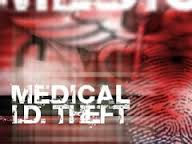 One of the easiest ways to avoid this type of medical identity theft is simply to be aware of what you throw in the trash. Prescription medication labels carry such sensitive information as your full name and address, the prescribing physician, the type of medication, prescription number, and the pharmacy’s contact information—all of the things a thief needs to perform prescription fraud. Instead of throwing empty prescription bottles in the trash, including the drug information forms, remove the labels and shred them. Other ways to prevent prescription fraud:
One of the easiest ways to avoid this type of medical identity theft is simply to be aware of what you throw in the trash. Prescription medication labels carry such sensitive information as your full name and address, the prescribing physician, the type of medication, prescription number, and the pharmacy’s contact information—all of the things a thief needs to perform prescription fraud. Instead of throwing empty prescription bottles in the trash, including the drug information forms, remove the labels and shred them. Other ways to prevent prescription fraud:
- Review every explanation of benefits (EOB). Examine the charges for medical visits or prescriptions you didn’t receive, and report any suspicious activity immediately.
- Never simply toss medical information in the trash. Dumpster divers can easily access your personal information if you fail to shred the documents.
- Secure medical records. Keep your medical records in a safe place inside your home or in a safe deposit box, away from the prying eyes of visitors. Believe it or not, friends and relatives who have easy access to your personal information are often the culprits.
- Safeguard prescription bottles. Hide or lock-up your medication rather than leaving it in plain sight or in a medicine cabinet. This will prevent anyone from walking off with your prescription medication and, later, your identity.
- Manage written prescription slips. Don’t throw them away or leave them out where they can be stolen. These slips are all an identity thief needs to fill a prescription in your name, leave you without your medication, steal your medical identity, and even put your life in danger.
- Enlist the help of an identity theft protection service such as ID Theft Solutions, which can proactively help prevent medical identity theft and even restore your identity when it’s stolen.
Protecting your identity is an ongoing process that takes vigilance. By taking some common sense precautions, you can avoid the exorbitant costs and health risks of medical identity theft. Get more tips for preventing prescription fraud and other types of medical identity theft by visiting The Identity Advocate at www.TheIdentityAdvocate.com or calling 310.831.4400.
Today’s Grave Robbers: Identity Theft and the Deceased
The term “grave robbing” used to refer to the appalling act in which thieves would dig up graves and steal a deceased person’s body and/or belongings. Today that term has taken on a new definition that is not only atrocious; it is also becoming an alarming trend. Over the past few years the number of identity theft cases involving the deceased has grown exponentially. Identity thieves know family members are too busy mourning the loss of a loved one to worry about protecting his or her identity. After all, who would think to protect the identity of a loved one who is deceased?
It is estimated that over 2.5 million deceased Americans become victims of identity theft each year. Identity thieves can get loans, obtain credit cards, and even apply for jobs under these stolen identities. About 800,000 deceased people are deliberately targeted—meaning the thieves know the person has passed away. That’s a shocking 2,200 people every day. While the debt amounts and numbers of cases found by authorities are astounding, the hassle and stress associated with recovering a deceased person’s identity and resolving those debts is damaging enough. Luckily, there are ways family members can prevent identity theft and enjoy a little peace-of-mind.
The three credit reporting agencies—TransUnion, Experian, and Equifax—can take up to six months to recognize that a person has passed away. This is prime time for identity thieves to take action, and they can do a tremendous amount of damage in this timeframe. When a loved one dies, family members should immediately notify all agencies and authorities rather than wait for them to receive word on their own. This can be done by:
- Sending a death certificate to each of the credit reporting agencies. Only official copies are accepted, so it is recommended that family members obtain at least a dozen copies.
- Requesting an alert on the deceased’s credit report that states “Deceased. Do not issue credit.” This will prevent new accounts from being opened.
- Sending a death certificate to any credit card companies, financial institutions, and even collection agencies where the deceased may hold accounts.
- Notifying the DMV and canceling the deceased’s driver’s license so an identity thief cannot change the address and use the license to commit fraud.
- Sending a death certificate and reporting the death to the Social Security Administration. A person’s Social Security number is one of the most important pieces of information used to steal an identity.
- Contacting the bank to setup a credit freeze so identity thieves cannot open new accounts.
Family members should send all correspondence via certified mail and keep copies of their correspondence as well. They can also prevent identity theft by shredding documents containing the deceased’s personal information before discarding them.
Obituaries
Identity thieves often scan local obituaries looking for their next victims. Families can prevent making their loved one a target by omitting any valuable personal information, such as date of birth, birthplace, spouse’s name, address, and maiden name.
Review Credit Reports
The executor of a deceased person’s estate or his surviving spouse may request a copy of his credit report from each of the credit reporting agencies. Family members should examine the credit reports carefully and see if any suspicious activity—such as new credit card accounts or credit inquiries—have been made. Credit reports should be pulled immediately after death and then again a few months later.
These are some of the most important ways a family member of a deceased person can help prevent identity theft. Since these issues can be overwhelming, especially in the days and weeks following a loved one’s death, it’s often best to seek out professional assistance. Contact an identity theft prevention expert at 310.831.4400 and visit www.TheIdentityAdvocate.com for more information about protecting your loved one’s identity and reputation long after they’re gone.
You can also help prevent identity theft by hiring ID Theft Solutions, which is the only identity theft protection company managed by law enforcement and focuses on returning your identity back to pre-theft status.
Secure Document Shredding Helps Prevent Identity Theft
Identity theft is at an all-time high for consumers, but this insidious crime is not just a consumer problem. Companies of all types and sizes are vulnerable as well. After all, when you run a business, you’re no longer just looking out for yourself. You’re responsible for protecting the confidential data of your company, your employees, and your customers as well.
As a business you store all kinds of personal information. From Social Security numbers to credit card data to birthdates, the information you collect, store, and discard can wind up in the hands of identity thieves if you don’t take the proper precautions to shred it.
 Secure document shredding is one of the most overlooked aspects of running a business. Simply tossing a sensitive document in the trash or recycling bin puts a customer at risk for identity theft—and your business at risk for costly fines and lawsuits. The public damage to your reputation from exposing customer information can be devastating as well, all of which can result in your business having to close its doors.
Secure document shredding is one of the most overlooked aspects of running a business. Simply tossing a sensitive document in the trash or recycling bin puts a customer at risk for identity theft—and your business at risk for costly fines and lawsuits. The public damage to your reputation from exposing customer information can be devastating as well, all of which can result in your business having to close its doors.
The Importance of Secure Document Shredding For Your Business
Although electronic identity theft is on the rise, stealing paper documents is the easiest way for an identity thief to steal the information needed to open new credit card accounts, get loans, write bad checks, and generally live the high life using your good name and credit.
Businesses who have consumer information on paper documents need to utilize a secure document shredding system that protects private data after it is no longer needed. Here are a few tips to help prevent identity theft in your business:
- Implement a document destruction policy within the company. Know which documents you need to save versus which you can throw away, and the specific steps you need to take to safely destroy information.
- Don’t recycle anything unless you shred it first. Leaving confidential documents in an open recycling bin is a sure-fire way to put your business at risk.
- Be proactive. It’s always the best way to safeguard your business from identity theft. Develop a culture of identity theft prevention and security as opposed to just being reactive when something goes wrong.
- Use a professional document shredding service. This is the best way to ensure there are no gaps in your plan to prevent document shredding fraud and identity theft.
Hiring a Document Destruction Company
Even smart businesses that hire a secure document shredding company often disregard investigating the team behind the service. These companies can hire non-bonded employees—even those with criminal backgrounds—who can gain instant access to thousands of documents containing personal information.
To protect and secure the identity of your business, employees, and customers, your organization should consider hiring a secure document shredding service that:
- Conducts background checks and inspections on each employee
- Employs a rigorous training procedure that ensures employees understand the reasons behind protecting your customer information
- Is certified as a document shredding specialist
- Has a secure document shredding chain-of-custody procedure
- Issues a Certificate of Destruction that confirms the secure shredding of your sensitive documents
 In addition to hiring a reputable document shredding service, it’s important to take precautions with your own staff. Teach your employees to shred all documents before recycling them. They should also be regularly trained on privacy policies and secure document shredding procedures to reduce the risks of identity theft.
In addition to hiring a reputable document shredding service, it’s important to take precautions with your own staff. Teach your employees to shred all documents before recycling them. They should also be regularly trained on privacy policies and secure document shredding procedures to reduce the risks of identity theft.
Protecting Your Identity at Home
Don’t forget that you also have your own personal information to protect at home. Buy and use a cross-cut shredder to shred anything that has private data, such as your name, phone number, address, bank account information, Social Security number, credit card offers, and any other documents that contain personal information.
In addition to always shredding personal data, one of the best ways for you and your business to prevent identity theft is to hire a service such as ID Theft Solutions—the only identity theft protection company that also recovers your identity. ID Theft Solutions is managed by law enforcement and focuses on returning your identity back to pre-theft status.
Get assistance developing a secure document shredding policy to help prevent identity theft in your business by visiting www.TheIdentityAdvocate.com or calling 310.831.4400.
Mobile Identity Theft Threats and Prevention Tips
Mobile identity theft is one of the fastest growing types of identity theft due to the prevalence of mobile devices such as smartphones and tablets. With over one billion smartphones being used globally and research predicting this number will double by 2015, the soaring sales of mobile devices come at a time when identity theft is at an all-time high.
There was one victim of identity theft every three seconds in the U.S. in 2012, totaling 12.6 million consumers—an increase of over one million victims compared to the previous year and accounting for more than $21 billion, according to Javelin Strategy & Research’s 2013 Identity Fraud Report. These numbers are expected to rise, especially as our use of mobile devices continues to increase.
 Preventing Mobile Identity Theft
Preventing Mobile Identity Theft
Whether it’s for email, instant messaging, surfing the web, shopping online, paying bills, or even banking, we store and share an immense amount of personal data on our mobile devices. Unless steps are taken to protect it, this data is vulnerable to identity thieves who want to use it to create fake identities and steal money.
Other than being convenient to use everywhere we go, it’s important to remember that smartphones are no different than desktops or laptop computers when it comes to hackers, viruses, malware, and spyware. Their apps and mobile browsers enable us to store personal information such as passwords, credit card numbers, and bank account data in addition to our contacts and other sensitive information. When this data is breached, however, the resulting identity theft can have severe and long-lasting consequences.
Fortunately, there are many actions you can take to secure your hand-held devices and avoid mobile identity theft. Here are a few tips:
- Create a strong password that is required to unlock your phone and access data. Make sure to set up the phone to automatically lock when it has not been used for a specified period of time.
- Never share sensitive data such as passwords or credit card numbers over an unsecured Wi-Fi connection. Even something as simple as purchasing movie tickets on an iPhone using a public Wi-Fi network can give a nearby hacker the opportunity to steal your data and use it to create a fake identity.
- Carefully review your phone bills for sudden increases in data usage. You also want to be on the lookout for charges from third-party content providers for services and apps you haven’t authorized. These can be signs that your phone has been hacked and puts you at risk for mobile identity theft.
- Keep your operating system and apps up-to-date. These updates are important for keeping your smartphone or tablet current with all of the latest security enhancements.
- Make sure you are shopping on secure websites by verifying that the “s” is in the “https://” in the address bar. Websites using “http://” at the beginning of the website address are unsecure.
Professional Offices and Mobile Identity Theft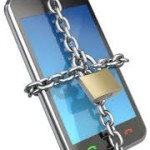
When trusted professionals or businesses use mobile devices to share information with clients, the same types of mobile identity theft are possible. Take, for example, healthcare professionals. Over 80 percent of physicians polled in an ABA Health survey revealed that they have used personal mobile devices to access the protected health information of their patients. This puts their patients at risk for mobile medical identity theft even when patients haven’t done anything to put their own identity in jeopardy.
Healthcare professionals can help secure medical records on mobile devices by creating passwords to authenticate access to patient information, and never sharing data over an unsecured Wi-Fi connection.
Mobile Identity Theft Protection Services
In spite of all the safeguards you put in place, hackers will always try to stay one step ahead of you and the available technology. Unfortunately, it’s not a matter of “if” but “when” your identity will be compromised. When it happens to you, don’t be caught without a mobile identity theft prevention plan.
There are a number of free mobile identity theft services, such as AVG, that offer anti-virus plans for mobile devices. Phones can be locked and located remotely, suspicious calls or text messages can be blocked, and widgets can detect questionable website activity.
The best identity theft protection service on the market is ID Theft Solutions. Managed by law enforcement professionals, ID Theft Solutions is the most comprehensive way to ensure your identity is recovered when it is stolen.
You can always count on The Identity Advocate to stay current on all of the latest mobile identity theft threats and solutions to help keep you and your mobile devices safe. Learn more about preventing mobile identity theft by visiting www.TheIdentityAdvocate.com or calling 310.831.4400.
This article was originally published on PInow.com.



